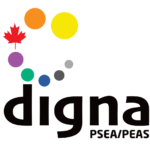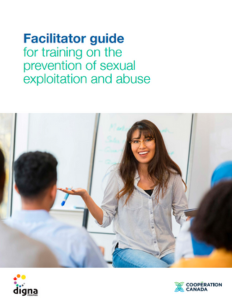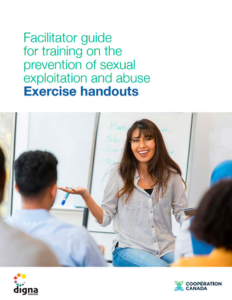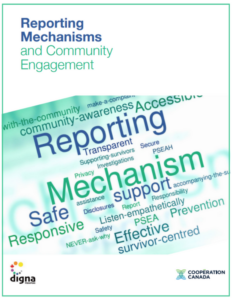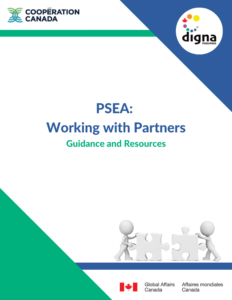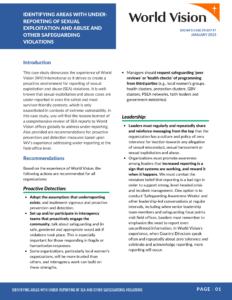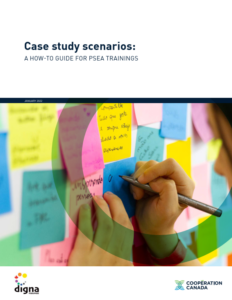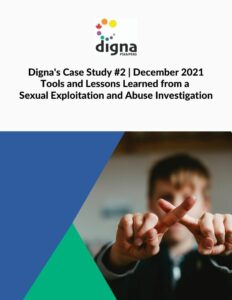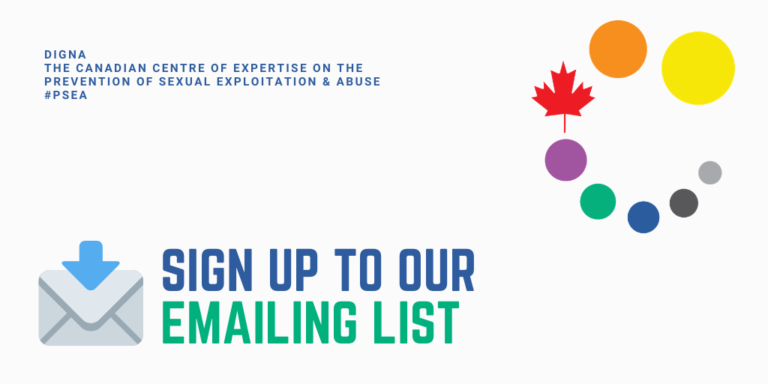Digna's Publications and Resources
Documents
July 2023
This facilitation guide is for PSEA focal points who are responsible for training their organization’s staff, volunteers, and partners. There are three elements to this training package.
- The facilitation guide with advice on how to prepare the training, facilitation tips, resources and sample agendas
- Handouts with trainer notes, timing for exercises and printable sheets for participants;
- A slide deck for a standard 1.5 day training, plus two extra slide decks for a two-day (Day 1, Day 2) training on case study scenarios and bystander intervention.
The exercise handouts were developed by Juliette Sanchez-Lambert, trainer, with inputs from Digna’s Training Working Group. It builts on resources and concepts from InterAction and The Inter-Agency Standing Committee (IASC).
Important:
You can use these resources to deliver training on PSEAH. Please, adapt them to your context and needs.
While the materials are free for use, we kindly request that you attribute the source by mentioning “Digna” whenever you reference or share this information with others as the materials remain Digna’s intellectual property.
How to quote?
Copyright: Digna, The Canadian Centre of Expertise on the Prevention of Sexual Exploitation and Abuse (PSEA). Train the Trainers course on PSEA materials.
July 2023
This resource is the exercise handouts accompanying the Train the Trainers facilitator guide. You will find inside content covering:
- Power Walk
- SEA definitions
- Key Principles of a Reporting System
- Barriers to Reporting
- Short case studies
- Long case study
- Bystander intervention
The exercise handouts were developed by Juliette Sanchez-Lambert, trainer, with inputs from Digna’s Training Working Group. It builts on resources and concepts from InterAction and The Inter-Agency Standing Committee (IASC).
Important:
You can use these resources to deliver training on PSEAH. Please, adapt them to your context and needs.
While the materials are free for use, we kindly request that you attribute the source by mentioning “Digna” whenever you reference or share this information with others as the materials remain Digna’s intellectual property.
How to quote?
Copyright: Digna, The Canadian Centre of Expertise on the Prevention of Sexual Exploitation and Abuse (PSEA). Train the Trainers course on PSEA materials.
May 2023
Having an effective SEAH reporting mechanism is crucial for organizations to prevent sexual exploitation, abuse, and harassment. We developed the Reporting Mechanisms and Community Engagement resource to help you better understand a complaints (or reporting) mechanism structure and design one that allows the participants in your programs to submit their complaints and set clear procedures you will be using to follow up on those complaints. You will find in this resource:
- Characteristics of an effective reporting mechanism
- Steps to setting up an effective reporting mechanism
- Roles and responsibilities when it comes to reporting
- Do’s and dont’s to respond to disclosures
- Tips for receiving reports of SEAH
This resource was created by Adriana Leigh, for Digna.
Adriana Leigh is Founder and Principal Consultant at Adriana Leigh Group – ALG Consulting. She brings 19+ years of diverse global experience as a workplace human rights lawyer and facilitator in gender equality, sexual harassment, and gender-based violence prevention, diversity, and inclusion. She has vast experience working nationally and internationally with the United Nations, universities as well as the non-profit and private sector.
Trilingual in English, French and Spanish, Adriana leverages her well-rounded background to support organizations to build sexual and gender-based harassment-free, inclusive environments and relations through training, policy development, coaching, thought leadership and knowledge building and sharing. Prior to her consulting work, Adriana spent several years as a human rights lawyer specializing in workplace discrimination and sexual harassment and taught Women and the Law at the University of Ottawa.
Adriana previously held the position of Director, Organizational Wellness at Homewood Health, developing workplace solutions in areas including gender diversity, sexual harassment, and workplace mental health. In addition, she worked with Equitas – International Centre for Human Rights Education leading development of gender equality action planning and international guidelines and protocols to prevent sexual and gender-based violence. More about Adriana.
March 2023
This Guidance and resources document includes key elements related to PSEA to consider when working with partners. It presents best practices and resources related to capacity assessment, capacity strengthening, risk assessment, due diligence, complaints handling mechanisms, partnership agreements, safe and inclusive programming and financing. Resources are referenced throughout the document, and compiled at the end for ease of reference.
This document is based on the content developed by consultants, Renée Wolforth and Virginie Vuylsteke, for the Digna training, “PSEA: Working with Partners,” held online on the 16th, 22nd, and 23rd of November 2022. This document complements the power point presentations used for the training.
January 2023
In this case study, you will find the lessons learned of a comprehensive review of SEA reports to World Vision offices globally to address under-reporting. Also provided are recommendations for proactive prevention and detection measures based upon World Vision’s experience addressing under-reporting at the field-office level.
January 2023
This case study covers the uniqueness of addressing sexual exploitation and abuse in the context of international LGBTQI+ work, and its impacts on the process of designing a policy reflecting the necessary intersectional and inclusive perspective. It highlights the many challenges faced in the development of the policy, considering the young organization’s limited capacities and distinctive identity in the international cooperation sector as an international LGBTQI+ alliance.
October 2022
In October 2019, Crossroads International launched an organizational Policy and Code of Conduct to mitigate, investigate and respond to sexual exploitation and sexual abuse. Anticipating organizational growth, the organization recognized a critical need to create a Sexual Violence Survivor Support Guide. This guide covers principles of safety, confidentiality, respect and non-discrimination.
In this case study, you will find the process behind creating the guide, the implementation, the challenges Crossroads International faced, their lessons learned and some recommendations. You will also be able to access all the relevant documents.
August 2022
In partnership with Oxfam Canada, this Digna case study addresses the Inter-Agency Standing Committee (IASC) Minimum Operating Standards for PSEA around effective community-based complaints mechanisms (CBCM), including survivor assistance. The documents presented here showcase best practices and resources that other organizations can draw from when developing their own CBCM.
You will find examples of diverse documents that are essential for your organization, such as policies, reporting channels, standard operating procedures and lessons learned.
June 2022
Everyone in your organization should have a grasp on what to do when someone comes forward with an allegation or seeking support following an act of sexual violence. Survivors may go to anyone in the organization, so ensuring a consistent, safe and supportive reaction and reception is key. That is the reason why we created a guide to support organizations in preparing to support survivors of sexual exploitation and abuse, before an incident occurs.
April 2022
This case study outlines the steps taken by VIDEA to undertake the 3rd annual review of their “Anti-Harassment and Safeguarding Policy and Procedures” through a decolonial feminist and inclusive lens. This paper recounts the process of this review in order to allow for its recreation by organizations that aim to integrate their decolonial, feminist, anti-racist and inclusive values into policies. This particular policy covers harassment, in addition to sexual exploitation and abuse (PSEA), as VIDEA understands these issues to be interconnected and most effectively addressed together.
January 2022
This document was created to help organizations provide their staff, volunteers, and partners with opportunities to discuss and understand the prevention of sexual exploitation and abuse using case study scenarios as a training tool.
This guide does not provide all the answers, but instead seeks to support trainers, organizational leaders and PSEA focal points in leading discussions to promote understanding of everyone’s role in balancing power.
December 2021
In July, we started publishing a series of case studies developed in collaboration with Cooperation Canada’s membership. The second of this series showcases the experience of an international development agency undergoing a sexual exploitation and abuse investigation.
In this case study, you will find the results of the investigation into an allegation that a community volunteer had been demanding sexual relationships in exchange for livelihood support, or for the inclusion of local community members’ names in project activities and/or benefits. There are some recommendations provided by the SEA investigator, the tools developed during the investigation process, and the agency’s lessons learned.
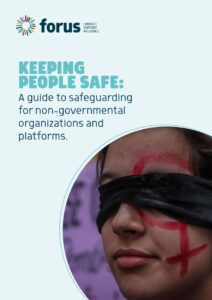
July 2021
Keeping People Safe: A guide to safeguarding for non-governmental organizations and platforms
This guide caters to a dual audience: NGOs of different sizes and levels of experience with safeguarding, and NGO platforms operating at national, regional and international levels.
The purpose of this guide is to support organizations working to strengthen their safeguarding policies, procedures and practices to prevent bullying, harassment, abuse and exploitation, and to appropriately respond when said instances do occur.
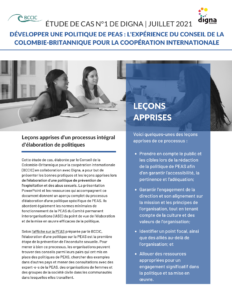
July 2021
Developing a PSEA Policy: BCCIC'S Experience
This case study, developed by the British Columbia Council for International Cooperation (BCCIC) in collaboration with Digna, aims to present good practice and lessons learned while developing a policy to prevent sexual exploitation and abuse.
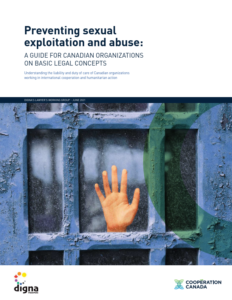
June 2021
The guide addresses legal frameworks regulating prevention of and responses to sexual misconduct. In particular, the LWG provides information about: the duty of care required by organizations to ensure that their volunteers, employees, and program participants are protected from sexual abuse, harassment, and exploitation; basic principles organizations should consider when developing policy and conducting internal investigations; and criminal law responses in Canada and abroad.
Finally, the LWG provides a brief overview of intentional consideration to protect traditionally equity-seeking groups who are LGBTQ2I, Indigenous, ethnic and religious minorities, and disabled persons, among others.
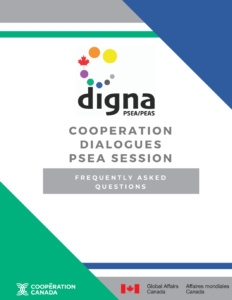
March 2021
Cooperation Dialogues - PSEA Session - FAQ
On February 24th, 2021, Digna, the Canadian centre of expertise on the prevention of sexual exploitation and abuse (PSEA), hosted a dialogue with GAC’s PSEA unit and departmental focal points. The objective of the PSEA dialogue session was to provide a space where sector partners and GAC could discuss PSEA requirements and expectations. It was also an opportunity to discuss current challenges and opportunities to strengthen sector PSEA capacity, compliance and accountability in the delivery of international assistance, and Digna’s role in these efforts.
The answers to the below Frequently Asked Questions (FAQ) document are derived from the content of the dialogue.
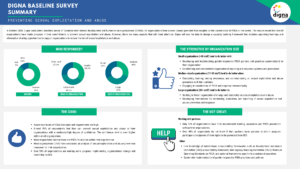
October 2020
Baseline Survey Summary
In October 2020, Digna conducted a baseline survey of Canadian international development and humanitarian organizations (IDHOs). 49 organizations from across Canada provided their insights on the current state of PSEA in the sector.
The results reveal that overall organizations have made progress in their commitments to prevent sexual exploitation and abuse. However, there are many aspects that still need attention. Digna will use the data to design a capacity building framework that includes upcoming trainings and information sharing opportunities to support organizations to reduce the risk of sexual exploitation and abuse.
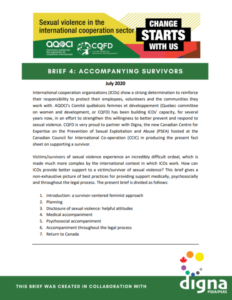
July 2020
Accompanying Survivors
AQOCI’s Comité québécois femmes et développement (Quebec committee on women and development, or CQFD) partnered with Digna to produce this fact sheet on supporting a survivor.
Survivors of sexual violence experience an incredibly difficult ordeal, which is made much more complex by the international context in which international cooperation organizations work. How can these organizations provide better support to a survivor of sexual violence? This brief gives a non-exhaustive picture of best practices for providing support medically, psychosocially and throughout the legal process.
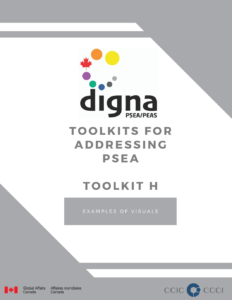
June 2020
Toolkits For Addressing PSEA
The toolkits explore strategies that can be used while working towards the PSEA. Based on the database of resources under compilation by Digna, we have developed eight different toolkits. In general terms, they unpack what many different organizations from the international development and humanitarian sector have done to address sexual exploitation and abuse. This includes their approaches to managing risk, their strategies and the best practices they have put forth. This document provides the full set of toolkits, each available individually. Overall, the eight toolkits provide over forty straightforward and practical documents.
Digna is committed to providing your organization with clear and useful tools. We hope they will help your work developing PSEA policies, as well as reaching partners, program and project participants in a respectful and ethical way.
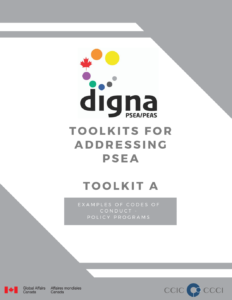
June 2020
Toolkit A
Examples of Codes of Conduct - Policy Programs
This toolkit contains eleven documents, which are samples of principles, guidelines and codes of conduct, and might be used as examples for each organization to develop their own recommendations regarding PSEA.
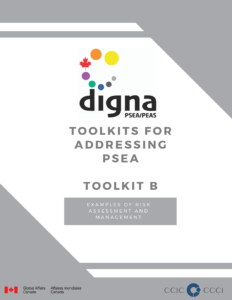
June 2020
Toolkit B
Examples of Risk Assessment and Management
This toolkit contains five documents, which are samples of useful tools to identify risk indicators and strategies to manage them, and might be used as examples for each organization to develop their own risk management systems.
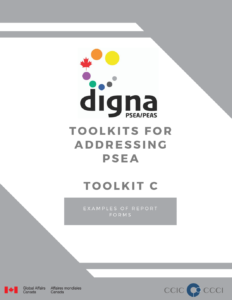
June 2020
Toolkit C
Examples of Report Forms
This toolkit contains four documents, which are samples of report and referral forms, and instructions on how to proceed while processing a disclosure. They could be used as examples for each organization to develop their own forms regarding PSEA.
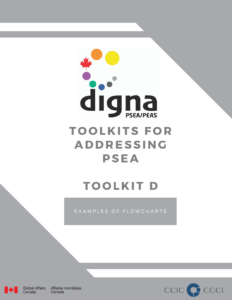
June 2020
Toolkit D
Examples of Flowcharts
This toolkit aims to provide your organization with flowcharts to support the development of programs on the Prevention of Sexual Exploitation and Abuse (PSEA).
It contains six documents, which are samples of visually-friendly diagrams. They could be used as examples for each organization to develop their own pathways regarding the procedures on PSEA.
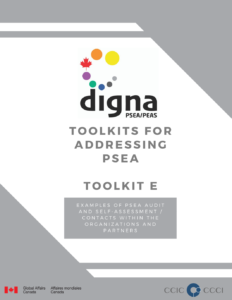
June 2020
Toolkit E
Examples of PSEA Audit and Self-Assessment - Contacts Within the Organizations and Partners
This toolkit contains seven documents, which are samples of contact lists and check-lists. They could be used as examples for each organization to produce their own call trees and self-assessment forms regarding PSEA.
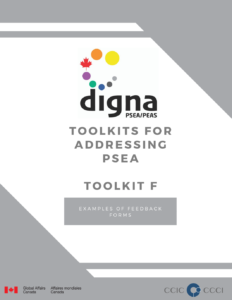
June 2020
Toolkit F
Examples of Feedback Forms
This toolkit contains two documents, which are samples of feedback forms. They could be used as examples for each organization to develop their own feedback materials on PSEA.
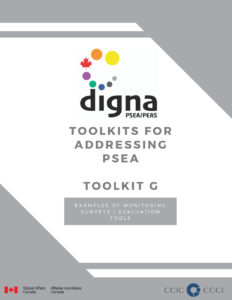
June 2020
Toolkit G
Examples of Monitoring Surveys - Evaluation Tools
This toolkit contains five documents, which are samples of monitoring surveys and evaluation tools. They could be used as examples for each organization to develop their own evaluation materials regarding PSEA.

June 2020
Toolkit H
Examples of Visuals
This toolkit contains four documents, which are samples of visual information materials. They could be used as examples for each organization to develop their own visually-friendly documents regarding PSEA.
Videos
February 2021
Reducing Recruitment Risks for the Prevention of Sexual Exploitation and Abuse - Webinar -
How can your organization ensure that perpetrators of sexual misconduct are not putting your program participants at risk? And how can we as a sector ensure that those people aren’t moving within and between different humanitarian and development agencies?
January 2021
From a Pledge to a Plan: What Next? - Digna's First Conference
Digna’s virtual conference on how the international cooperation sector can prevent and address sexual exploitation and abuse took place on January 27th, 2021.
The conference included sector leaders, government officials, and PSEA champions who discussed how we as a sector can prevent and address sexual exploitation and abuse.
May 2020
Reducing the Risk of Sexual Exploitation and Abuse during Crisis
In this session you will:
- Learn more about Digna
- Explore concrete steps your organization can take to limit sexual exploitation and abuse during the COVID-19 response and other crises
